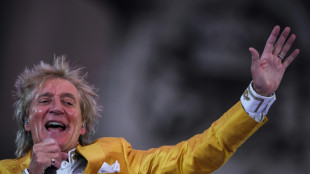Film 'flips the angle' on iconic Thelonious Monk interview
Half a century after jazz great Thelonious Monk appeared on a French television program, a new documentary revisits outtakes from the 1969 interview to cast light on the racism and exploitation of black musicians.
When Monk met fellow musician and French TV producer Henri Renaud at a studio in Paris, it was a chance for the renowned pianist and composer to promote his music in Europe.
Previously unused footage from their interview features in "Rewind and Play", a new documentary that French-Senegalese director Alain Gomis says "flips the angle" on the power dynamics between the men.
"I wanted to show the machine that manufactures points of view, which are anything but neutral -- and how TV portrayed black musicians at that time," he told AFP in an interview following his film's screening at the Marrakech International Film Festival.
In his day, Monk was one of the United States' most celebrated black musicians.
The film's most revealing footage comes as he tells Renaud he believes he is being economically exploited.
"I was the star, people were coming to see it, but I wasn't getting the money," Monk says.
Visibly upset, Renaud tells his producer to delete the scene and asks the question again.
"I had no idea I'd made my popularity in France until I got over here," Monk says, while seated at a piano.
He explains he only understood his fame when seeing his photo on the cover of a jazz magazine.
Despite that, he continues, he struggled to find musicians to play with.
"I was getting less money than anybody," Monk says, chuckling. "That's what happened."
After translating the comments for the camera, Renaud says: "I think it's better to erase this bit... it's disparaging what he's saying, best not to talk about it."
When Monk begins to tell the story for a third time, Renaud asks him to talk about something else.
"It's no secret, is it?" Monk asks.
"No, but it's not nice," Renaud responds.
As a pianist, Monk was a talented improviser and was credited with helping to develop the bebop style. He produced a string of hits in the jazz standards library, including "Round Midnight" -- famously interpreted by Miles Davis and John Coltrane.
But the interactions with Renaud are little short of cringeworthy.
- 'Spitting in the soup' -
Gomis, whose previous work "Felicite" won the Grand Jury Prize at the 2017 Berlin International Film Festival, offers a critique of how Renaud selected which footage to use.
"He builds an embarrassing, subjective representation of (Monk) and doesn't let him break out of that framework," Gomis said.
The film opens with Renaud leaning on a piano and introducing Monk, who sits at the keys sweating profusely and looking awkward.
"It's like he's saying, 'Why are you spitting in the soup?' (biting the hand that feeds). Throughout the interview, you can feel that condescension."
Gomis says Renaud reveals his privileged background when he asks incredulously why Monk put his piano in the kitchen.
Monk responds that it was the only place in the home that it would fit.
For a musician of his background, "putting a piano in a kitchen was not a fantasy," Gomis said.
Monk was born in North Carolina in 1917 but grew up in New York's San Juan Hill -- a poor district that was later demolished and became Manhattan's exclusive Upper West Side.
Gomis plans to make a full-length biopic on Monk and hopes "Rewind and Play", due to hit French screens in 2023, will help "deconstruct" the exchange.
"We often think of the archive as objective testimony," he said. "But it puts across the point of view of the one who makes it."
潘-H.Pān--THT-士蔑報




